
The Band was a Canadian-American rock group formed in Toronto, Ontario, in 1967. Originally the backing band for Ronnie Hawkins and later Bob Dylan, the group released its debut album, Music from Big Pink, in 1968 to critical acclaim. Described by music critic Bruce Eder as "one of the most popular and influential rock groups in the world, their music embraced by critics ... as seriously as the music of the Beatles and the Rolling Stones". The Band combined elements of Americana, folk, rock, jazz, country, and R&B, influencing subsequent musicians such as the Eagles, Elton John, the Grateful Dead, the Flaming Lips, and Wilco.

Everything Went Black is a compilation album by the American hardcore punk band Black Flag. It was released in 1982 through SST Records. The compilation comprises early songs recorded before Henry Rollins became the band's vocalist in 1981, and was initially released without the group's name on its cover, due to their lawsuit with MCA/Unicorn. Instead, the names of the group members were listed on the first release.

Coleman Randolph Hawkins, nicknamed "Hawk" and sometimes "Bean", was an American jazz tenor saxophonist. One of the first prominent jazz musicians on his instrument, as Joachim E. Berendt explained: "there were some tenor players before him, but the instrument was not an acknowledged jazz horn". Hawkins biographer John Chilton described the prevalent styles of tenor saxophone solos prior to Hawkins as "mooing" and "rubbery belches." Hawkins cited as influences Happy Caldwell, Stump Evans, and Prince Robinson, although he was the first to tailor his method of improvisation to the saxophone rather than imitate the techniques of the clarinet. Hawkins' virtuosic, arpeggiated approach to improvisation, with his characteristic rich, emotional, loud, and vibrato-laden tonal style, was the main influence on a generation of tenor players that included Chu Berry, Charlie Barnet, Tex Beneke, Ben Webster, Vido Musso, Herschel Evans, Buddy Tate, and Don Byas, and through them the later tenormen, Arnett Cobb, Illinois Jacquet, Flip Phillips, Ike Quebec, Al Sears, Paul Gonsalves, and Lucky Thompson. While Hawkins became well known with swing music during the big band era, he had a role in the development of bebop in the 1940s.
"I Got Rhythm" is a piece composed by George Gershwin with lyrics by Ira Gershwin and published in 1930, which became a jazz standard. Its chord progression, known as the "rhythm changes", is the foundation for many other popular jazz tunes such as Charlie Parker's and Dizzy Gillespie's bebop standard "Anthropology ".
"Embraceable You" is a popular jazz song with music by George Gershwin and lyrics by Ira Gershwin. The song was written in 1928 for an unpublished operetta named East Is West. It was published in 1930 and included in the Broadway musical Girl Crazy where Ginger Rogers performed it in a song and dance routine choreographed by Fred Astaire.
"I Love Paris" is a popular song written by Cole Porter and published in 1953. The song was introduced by Lilo in the musical Can-Can. A line in the song's lyrics inspired the title of the 1964 movie Paris When It Sizzles.
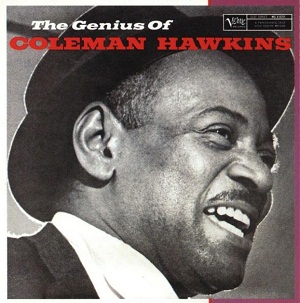
The Genius of Coleman Hawkins is a 1957 album by tenor saxophonist Coleman Hawkins, featuring the Oscar Peterson quartet.
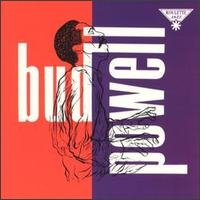
Bud Powell Trio is a studio album by jazz pianist Bud Powell, released on Roost in 1957, featuring two sessions that Powell recorded in 1947 and 1953. The 1947 session was Powell's first studio recording as leader, and was originally released as a 10" LP called The Bud Powell Trio.

Sonny Meets Hawk! is a 1963 album by jazz saxophonist Sonny Rollins, with Coleman Hawkins appearing as guest artist. It was recorded at RCA Victor Studio "B" in New York City on July 15 and 18, 1963. The album features some of Rollins's most avant-garde playing.

Sittin' In is a 1957 studio album by Dizzy Gillespie, featuring the saxophonists Stan Getz, Paul Gonsalves and Coleman Hawkins.

"You Gets No Love" is a song by American singer Faith Evans. It was written by Evans along with Tevell Coleman, Mechalie Jamison, Kameelah Williams, Chauncey Hawkins, Mechalie Jamison, Andre Wilson, and Michaelangelo Saulsberry for her third studio album Faithfully (2001), while production was helmed by Saulsberry, with Evans co-producing. The song was released as the album's leading single in July 2001 and peaked at number 28 on the US Billboard Hot 100, also reaching number eight on the Billboard Hot R&B/Hip-Hop Songs chart.

The Greatest Jazz Concert in the World is a 1967 live album featuring Duke Ellington and his orchestra, Ella Fitzgerald, Oscar Peterson, T-Bone Walker, Coleman Hawkins, Clark Terry and Zoot Sims. It was released in 1975.

At Ease with Coleman Hawkins is an album by saxophonist Coleman Hawkins which was recorded in 1960 and released on the Moodsville label.

Good Old Broadway is an album by saxophonist Coleman Hawkins which was recorded in 1962 and released on the Moodsville label.

Sinatra: London is a 3CD & 1DVD Frank Sinatra box set released on November 25, 2014. It is the third in a series of city-themed box sets following Vegas and New York. The set includes the 1962 album Sinatra Sings Great Songs from Great Britain as recorded in London, as well as unreleased outtake material from those sessions and spoken introductions for each song intended for a BBC radio special. The live material consists of a 1953 session from BBC Radio's The Show Band Show, a full concert recorded in 1984 at the Royal Albert Hall, and two concerts on the DVD, both recorded at the Royal Festival Hall in 1962 and 1970. The liner notes are written by Ken Barnes.
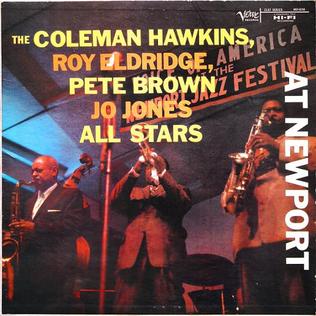
The Coleman Hawkins, Roy Eldridge, Pete Brown, Jo Jones All Stars at Newport is a live album by Coleman Hawkins's All Stars with Roy Eldridge, Pete Brown and Jo Jones recorded at the Newport Jazz Festival in 1957 and released on the Verve label.
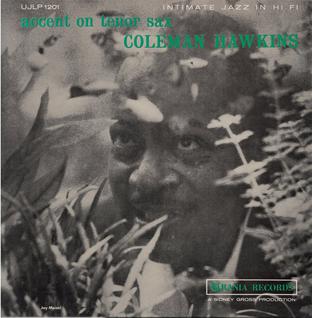
Accent on Tenor Sax is an album by saxophonist Coleman Hawkins which was recorded in 1955 for the Urania label.

The Hawk Talks is an album by saxophonist Coleman Hawkins compiling tracks recorded between 1952 and 1953 for the Decca label which were first released on LP in 1955.
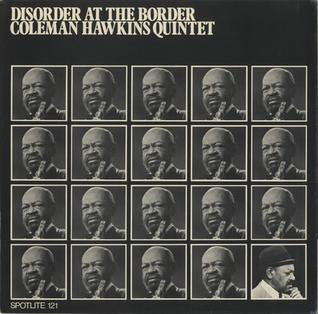
Disorder at the Border is a live album by saxophonist Coleman Hawkins compiling tracks which were originally broadcast in 1952 and first released on LP in 1973 on the UK Spotlite label.

Sirius is an album by saxophonist Coleman Hawkins recorded in 1966 but not released by the Pablo label until 1974.

















